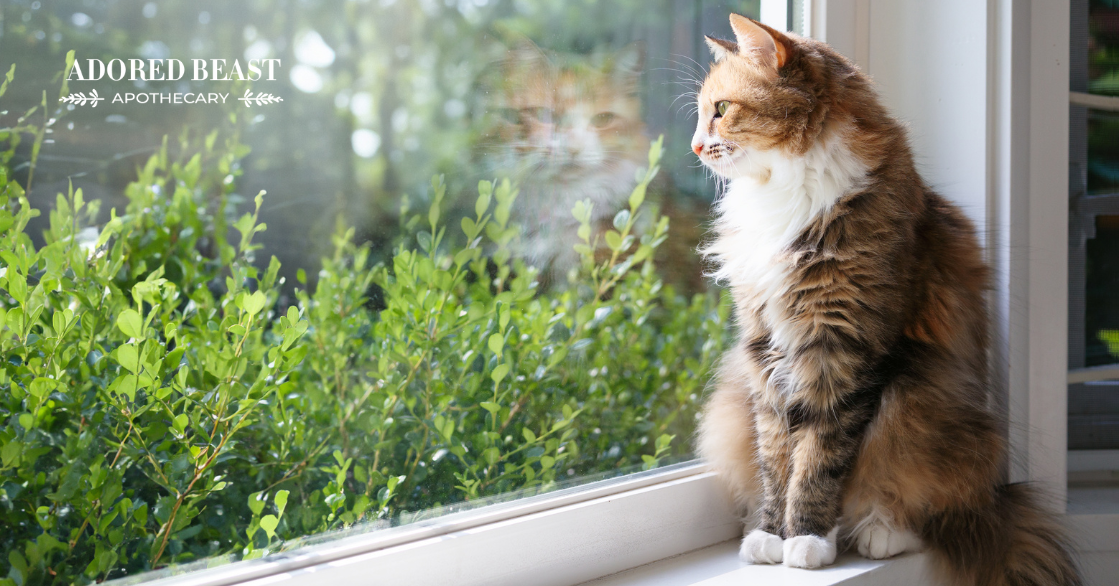It’s wonderful to watch our animals grow up. To see them mature and develop into their characters is so fun – whether they’re a snuggly fluffball or a stand-offish Garfield. However, as our beloved feline companions get older, they may face various health challenges.
One of the less talked about challenges is feline dementia, also known as cognitive dysfunction syndrome (CDS).
We’ve covered canine cognitive dysfunction before, so now it’s time to cover those kitties. Understanding what feline dementia is, recognizing its signs, and knowing how to prevent and manage it naturally can help you provide the best care for your aging cat.
What is Feline Dementia?
Feline dementia, similar to Alzheimer’s disease in humans, is a cognitive disorder that typically affects older cats. It is characterized by a decline in cognitive function, leading to behavioural changes and a decrease in the cat’s quality of life. This condition is more common in cats aged 10 years and older, but it can occur in younger cats as well.
While exact statistics on the prevalence of feline dementia are hard to come by, studies suggest that a significant percentage of cats over the age of 15 show some signs of cognitive decline. As veterinary care and nutrition improve, cats are living longer, making feline dementia an increasingly common concern for pet parents.
Signs and Symptoms of Feline Dementia
Recognizing the signs of feline dementia is crucial for early intervention and management. They can range from mild to severe, and there are several. It usually develops very slowly. Because of this, it can sometimes be hard to spot – many people just assume the symptoms are a ‘normal’ part of the aging process.
Common symptoms include:
- Disorientation: Cats may appear confused or lost, even in familiar surroundings. They might wander aimlessly or get stuck in corners.
- Changes in Sleep Patterns: Affected cats often sleep more during the day and become restless or vocal at night.
- Altered Interactions: Cats may become less social, avoiding interaction with their owners or other pets. Conversely, some may become unusually clingy.
- House Soiling: Litter box habits may change, with cats forgetting to use the litter box or having accidents in inappropriate places.
- Decreased Activity: There may be a noticeable decline in playfulness and exploration. Cats might lose interest in their favourite toys and activities.
- Anxiety and Restlessness: Increased anxiety or agitation, often manifesting as pacing, meowing, or yowling, can be a sign of cognitive decline.
- Changes in Appetite: Some cats may eat less, while others might exhibit an increased appetite without corresponding weight gain.
Natural Ways to Prevent Feline Dementia
While there is no guaranteed way to prevent feline dementia, certain lifestyle and dietary measures can support your cat’s cognitive health:
- Balanced Diet: Providing a balanced, nutrient-rich diet is essential. Foods high in antioxidants, omega-3 fatty acids, and vitamins E and C can support brain health.
- Mental Stimulation: Engage your cat in activities that challenge their mind. Puzzle toys, interactive games, and training sessions can help keep their brain active.
- Regular Exercise: Physical activity promotes overall health and can help maintain cognitive function. Ensure your cat has opportunities for regular play and exploration.
- Environmental Enrichment: Create a stimulating environment with climbing structures, scratching posts, and interactive toys. Rotate toys regularly to keep your cat engaged.
- Social Interaction: Regular interaction with people and other pets can help keep your cat mentally sharp. Encourage social activities and provide affection and attention.
Natural Management of Feline Dementia
If your cat is diagnosed with feline dementia, several natural strategies can help manage the condition and improve their quality of life:
- Consistent Routine: Establish and maintain a consistent daily routine for feeding, playtime, and bedtime. Predictability can reduce anxiety and confusion.
- Supplements: Many supplements can support brain health:
- Omega 3s play an important role in brain health.Try algae oil for a pet- and environmentally-safe alternative to safe oil.
- Medium-chain triglycerides (MCT oil) help increase blood ketone levels and improve age-related decline in cognitive function.
- Lion’s mane mushrooms are also incredibly valuable for supporting brain health.
- Pre- and Probiotics have been shown to help to slow down cognitive decline. In fact, studies suggest probiotics for both prevention and to help slow the progression of Alzheimer’s.
- Antioxidants are important at any age, but high levels of free radicals seem to lead to decline in cognitive function, so antioxidants can help balance those levels out. We use phytoplankton because of the superoxide dismutase (SOD).
- Comforting Environment: Create a calm, safe, and familiar environment. Avoid making significant changes to their surroundings and provide cozy, quiet spaces for rest.
- Gentle Exercise: Encourage gentle, low-impact exercises like short play sessions or slow walks around the house. Physical activity can help maintain cognitive function.
- Herbal Remedies: Some herbal remedies, like valerian root or chamomile, may help reduce anxiety and promote relaxation. CBD oil can also be helpful for calming.
- Aromatherapy: Certain scents, such as lavender or chamomile, can have a calming effect on cats. Use a diffuser with cat-safe essential oils to create a soothing atmosphere. But don’t overdo it – a teeny bit goes a long way. And if your cat doesn’t like the smell, don’t use it.
- Patience: Be patient with your adored beast. As they navigate the trials of this condition, they may need a little extra time and attention. Don’t get frustrated, and show them all the love they need (and deserve).
Feline dementia is a challenging condition, but with early recognition and natural management strategies, you can help your cat maintain a good quality of life. By providing a balanced diet, mental stimulation, regular exercise, patience, and a consistent routine, you can support your cat’s cognitive health and well-being.












